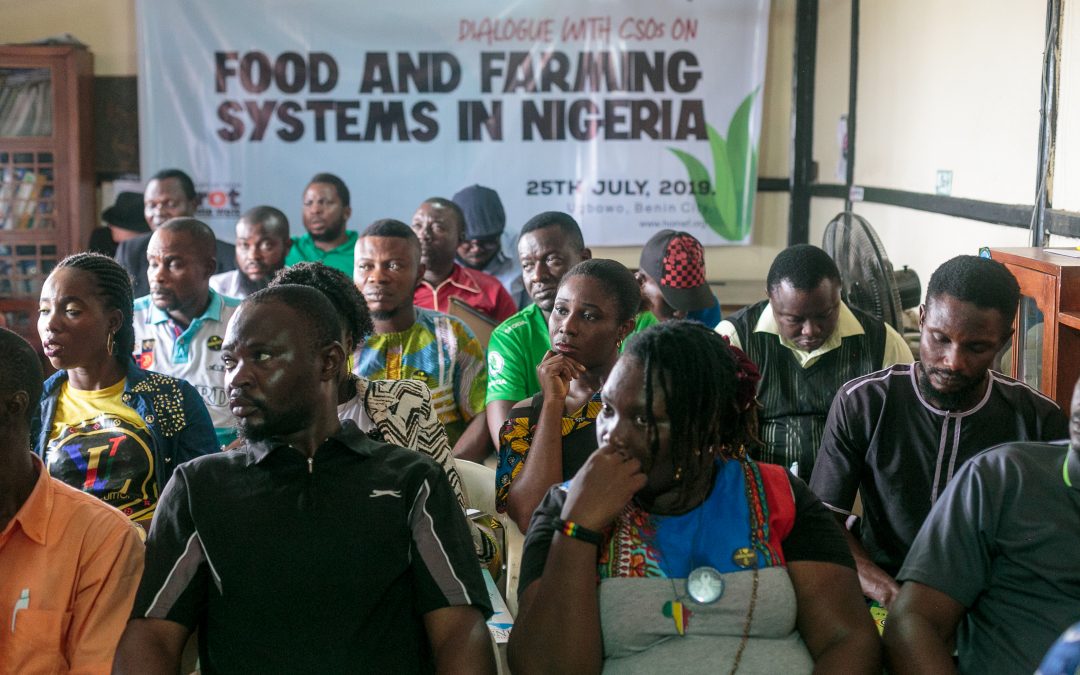Civil Society Organizations in Edo State gathered in Ugbowo on 25 July, 2019 in a Dialogue on Food and Farming System in Nigeria organized by Health of Mother Earth Foundation.
The highly interactive meeting examined the implications of genetically modified organisms on human, animal and environmental health and on Nigeria’s economy. The event also defined a viable alternative for increased agricultural productivity and climate resilience.
In his welcome words, the Director of HOMEF, Nnimmo Bassey, stated that the claim that GMOs will be the main way to feed the world is mere propaganda. He pointed out that besides the reality that GMOs do not necessarily increase yield or solve the problems of pests and diseases, researches show that at present, enough food to feed almost double of our current population is already being produced but most of it is used for industrial purposes, for animal feed or is simply wasted due to poor storage and processing facilities and lack of access to markets.
Bassey emphasized that we have the right to question the attempt to overturn our food systems, promote mono-cropping and project toxic chemicals as safe. “We must consistently defend our food sovereignty which ensures our right and access to safe, nutritious, healthy and culturally appropriate food at all times.”
Speaking at the Dialogue, Daniel Olorunfemi, Professor of Genetic Toxicology in the University of Benin, explained the process of genetic modification and how it affects human and environmental health. Some of the health impacts of GMOs which were highlighted are immune disorders, cancers, reproductive defects and infant mortality. On the environment, GMOs present risks of horizontal gene transfer and unintended harm to non-target organisms.
“We do not need GMOs. We have the landmass, rich soils and good climate conditions that can ensure food productivity,” Olorunfemi added.
Speaking on the cultural, political and economic perspective of GMOs, Bassey pointed out that GMOs erode local knowledge and destroy the resilience of natural ecosystems which is based on biodiversity. “Real solutions exist. The United Nations-World Bank-sponsored International Assessment of Agricultural Knowledge, Science and Technology for Development (IAASTD)research carried out by 400 development expertsfor a period of3 yearsrecommended that nations must urgently revitalize public sector agricultural research, invest in smallholderfarmer-oriented, low-input agroecologyfarming system and reform unfair trade-related rules.”
Discussions on the viable alternative to GMOs which was led by HOMEF’s Biosafety Project Officer, Joyce Ebebeinwe, revealed that Agroecology presents a holistic approach to the challenges of agricultural productivity and in addition, climate change. It is a knowledge intensive system which manages ecosystems by replacing external inputs with natural processes; ensures quantity and quality production and; also preserves the soil for future generations.Some of the innovations of agroecology highlighted include biological pest control, the push and pull method, participatory plant breeding, and agroforestry.
The Dialogue closed with group discussions on the way forward for Nigeria and the following resolutions were reached by all the participants.
- The government of Nigeria:
- Should ban GMOs now and begin to invest in agroecological farming systems. State and a Local Governments should urgently declare their states and local government areas GMO-free as a way of encouraging the Federal Government to take similar steps.
- Should critically review the National Biosafety Management Agency Act, 2015 to close loopholes that allow for the unchecked infiltration of GMOs and ensure that regulators consider environmental and human health on a case-by-case basis as they entertain applications,
- Increase support for farmers in terms of infrastructure, extension services, access to land and loans, and access to markets.
- Include agroecology in her National Climate Change Adaptation Plan and increase funding for research in its principles and practice.
- Should create a database to reach and sustain contact with real farmers and avoid working with “ghost or absentee farmers”
- Should establish seed banks to preserve indigenous seed varieties and promote seed fairs to facilitate learning/exchanges among farmers.
- Civil Society organizations should:
- Carry out more awareness to drive the message of the impacts of GMOs to the farmers/ grassroots.
- Engage more with the media especially by using social media for a wider coverage.
- Farmers should:
- Ask questions and reject seedlings suspected to be genetically modified
- Form clusters to advocate against GMOs and synergize with CSOs to engage the government.
4. Consumers:
- Should insist on their right to safe and nutritious foods
- Should reject GMOs and carefully scrutinize labels before making purchases





